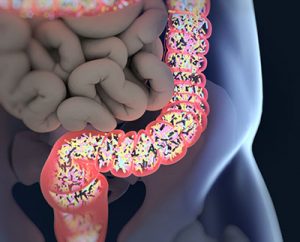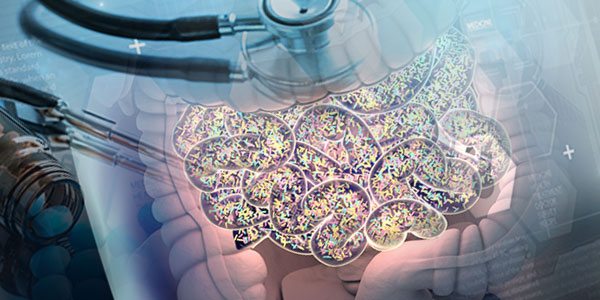Improving the condition of your gut microbiome can improve your mood, lower stress levels, increase cognitive function and boost your memory.
Maintaining a healthy gut microbiome requires careful management and can be heavily impacted by the following factors:
- Medications, particularly antibiotics
- The food you eat
- Stress levels
The Brain In Your Gut

This portion of the body is sometimes referred to as the little brain, but this lining of your digestive tract actually contains more than 100 million nerve cells from esophagus to rectum. The practice of “going with your gut” is powerful.
Pills May Be Part of the Problem
A long-standing practice of excessive antibiotic use can damage the natural balance of the gut. Of course, if you’re suffering from a bacterial infection, you must address it. Unfortunately, the use of antibiotics for a viral infection can lead not only to gut damage caused by killing off the good bacteria, but also can cause damage to and upset the balance of the enteric nervous system.
What About Probiotic Supplements?
There are probiotic supplements that can improve the health of the gut microbiome, but it’s important to remember that stomach acid is powerful and may heavily damage whatever probiotics you ingest. Study labels and look for products that contain a combination formula of probiotics and probiotics to insure optimal benefits.
Diet and a Healthy Gut Microbiome
Below are several foods that can improve the health of your gut:
- Miso
- Onions
- Sauerkraut
- Yogurt
- Garlic
- Jicama
- Kimchi
The following are some of the foods that can damage the health of your gut:
- White flour
- Processed sugars
- Gluten
- Aspartame
- GMOs, particularly those developed to resist glyphosate, a common weed-killer
Get a Grip On Stress

In addition, digestive stress can inflame emotional distress. Digestive pain can make the process of eating so unpleasant that you avoid mealtime connections and withdraw socially just when you really need human contact.
Keep Your Gut Young As You Age
It is said that aging is a gift; not everyone gets to enjoy it. However, the changes in the brain as we age can be worrisome. Inflammation in the body and brain can increase your risk of dementia, particularly diseases such as Alzheimer’s disease. To reduce this inflammation and protect your brain, a diet rich in polyphenols can help.
To increase your intake of polyphenols, focus on fruits and vegetables and work to eat a rainbow of food. Tomatoes, grapes and blueberries are all an excellent source of polyphenols. Ingesting foods rich in polyphenols is critical if you smoke; smoking increases the risk of inflammatory damage to the brain, but polyphenols can reduce that inflammation.
The body is not a collection of separate parts; it must work together if you are to stay truly healthy. Avoid ingesting anything that will upset the health of your gut. If your gut is damaged, start incorporating foods that will support gut health. Take only the antibiotics you need and build stress-reducing activities into your day.





